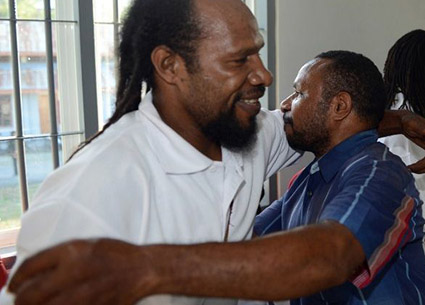
The release of five West Papuan prisoners raises hope that the many political prisoners still held would be freed, but they remain unlawfully behind bars, as Phelim Kine, deputy Asia director Human Rights Watch reports.
JAYAPURA (Human Rights Watch/BBC/Pacific Media Watch): Indonesian President Joko Widodo’s move to grant clemency to five Papuan prisoners ignores the dozens of political prisoners who remain behind bars in Papua and the Moluccas islands, Human Rights Watch said today.
Widodo announced clemency for Apotnalogolik Lokobal, Numbungga Telenggen, Kimanus Wenda, Linus Hiluka, and Jefrai Murib while visiting Papua’s provincial capital of Jayapura yesterday.
The five men, convicted by a Wamena court in 2003 for their alleged role in a raid on an Indonesian Armed Forces weapons arsenal in Wamena on April 4, 2003, that resulted in the deaths of two soldiers, were serving prison terms ranging from 19 years and 10 months to life imprisonment.
They were released during Widodo’s visit to Abepura prison, in Jayapura.
Only Telenggen and Murib, who were sentenced to life, were involved in the raid. The other three were arrested because of their pro-independence views.
“The release of five prisoners raises hope that the many political prisoners still held would be freed, but they remain unlawfully behind bars,” said Phelim Kine, deputy Asia director.
“The Indonesian government should release all political prisoners with an immediate presidential amnesty rather than demand prisoners admit ‘guilt’ for convictions that violated their basic human rights.”
38 Papuans in jail
The nongovernmental political prisoners’ advocacy organisation Papuans Behind Bars lists a total of 38 Papuans imprisoned, detained, on trial, or awaiting trial on charges that violate their freedom of expression and association. There are an estimated 29 other political prisoners in the Moluccas Islands, according to the Ambon-based Tamasu human rights group.
Most Papuan political prisoners reject the concept of clemency as it requires an admission of guilt in return for release.
The BBC reported that as well as ordering the release of five political prisoners, President Widodo also announced the lifting of travel bans for foreign journalists there.
"We need to create a sense of peace in Papua. This is just the beginning," Widodo said.
Rights groups have criticised Indonesia for its tough policies in Papua, where dozens have been jailed for simply raising the local flag of independence.
The Free Papua Movement (OPM) has been fighting a low-level struggle for independence ever since Dutch colonial rule formerly ended there in 1962.
Commentators have said recent developments suggest a change in policy for the government of Joko Widodo towards the region.
Still suspicions
While some people have applauded the decisions to release political prisoners and lift the travel ban as a step in the right direction, others remain suspicious of the government's intentions.
It comes weeks after Indonesia's move to execute seven foreigners and one Indonesian national, who were convicted of drug offences, sparked international outrage.
The government consistently arrests and jails protesters for peacefully advocating independence or other political change. Many such arrests and prosecutions are of activists who peacefully raise banned symbols, such as the Papuan Morning Star and the South Moluccan RMS flags.
Human Rights Watch takes no position on the right to self-determination, but opposes imprisonment of people who peacefully express support for self-determination.
Full Human Rights Watch article
This work is licensed under a Creative Commons Attribution-NonCommercial 3.0 New Zealand Licence.




